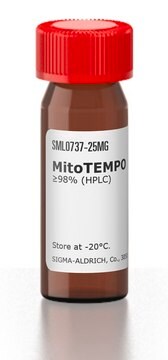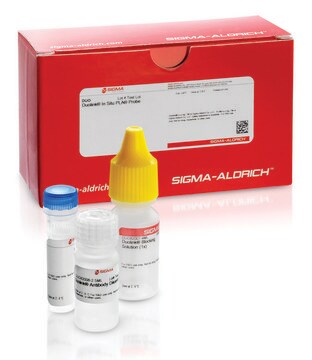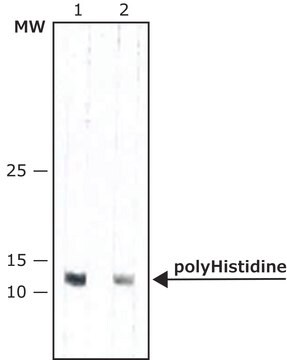Wichtige Dokumente
A0185
Monoclonal Anti-Biotin−Peroxidase antibody produced in mouse
clone BN-34, purified immunoglobulin
Synonym(e):
Monoclonal Anti-Biotin
About This Item
Empfohlene Produkte
Biologische Quelle
mouse
Qualitätsniveau
Konjugat
peroxidase conjugate
Antikörperform
purified immunoglobulin
Antikörper-Produkttyp
primary antibodies
Klon
BN-34, monoclonal
Verpackung
vial of 0.5 mL
Methode(n)
dot blot: suitable
flow cytometry: suitable
immunohistochemistry (formalin-fixed, paraffin-embedded sections): 1:300
indirect ELISA: 1:30,000
western blot (chemiluminescent): 1:80,000
Isotyp
IgG1
Lagertemp.
2-8°C
Posttranslationale Modifikation Target
unmodified
Suchen Sie nach ähnlichen Produkten? Aufrufen Leitfaden zum Produktvergleich
Allgemeine Beschreibung
Immunogen
Anwendung
- in immunohistochemistry
- in western blot
- as secondary antibody to detect the presence of aptamer on the membrane
In some applications, localization of biotinylated probes with avidin produces high background levels. Anti-biotin reagents may be substituted for avidin to decrease non-specific binding.
Biochem./physiol. Wirkung
Monoclonal Anti-Biotin-Peroxidase antibody specific for biotin conjugated to various proteins. The antibody recognizes free biotin and biocytin using competitive ELISA. Using indirect ELISA or immunohistochemical staining, the antibody also recognizes biotin conjugated to various immunoglobulins. The product specificity has been evaluated using biotinylated goat antibodies to human and rabbit antigens coated on multiwell plates.
Physikalische Form
Haftungsausschluss
Sie haben nicht das passende Produkt gefunden?
Probieren Sie unser Produkt-Auswahlhilfe. aus.
Signalwort
Warning
H-Sätze
Gefahreneinstufungen
Skin Sens. 1
Lagerklassenschlüssel
12 - Non Combustible Liquids
WGK
WGK 2
Flammpunkt (°F)
Not applicable
Flammpunkt (°C)
Not applicable
Hier finden Sie alle aktuellen Versionen:
Besitzen Sie dieses Produkt bereits?
In der Dokumentenbibliothek finden Sie die Dokumentation zu den Produkten, die Sie kürzlich erworben haben.
Kunden haben sich ebenfalls angesehen
Unser Team von Wissenschaftlern verfügt über Erfahrung in allen Forschungsbereichen einschließlich Life Science, Materialwissenschaften, chemischer Synthese, Chromatographie, Analytik und vielen mehr..
Setzen Sie sich mit dem technischen Dienst in Verbindung.











